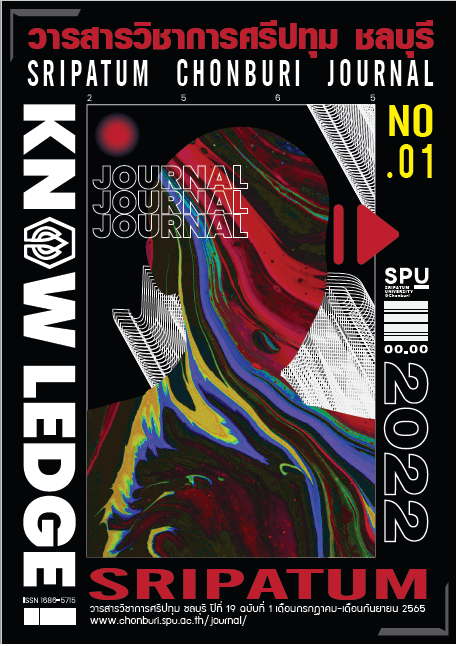THE ROLE OF LEADERSHIP STYLES IN COVID-19 PANDEMIC CRISIS MANAGEMENT: A STUDY OF AIRLINE BUSINESS IN THAILAND
Keywords:
Leadership styles, Crisis management, COVID-19, Airline businessAbstract
The objectives of this research were to study: 1) the leadership style of the airline business in Thailand, 2) the level of crisis management of the airline business in Thailand, and 3) the influence of leadership style on crisis management in the COVID-19 pandemic of the airline business in Thailand. The sample group of this research selected by random sampling were 424 full-time employees working in the airline business in Thailand. The data were analyzed by descriptive and inferential statistics, namely, frequency, percentage, mean, standard deviation, and regression analysis. The results revealed that the leadership style of the airline was mostly transactional leadership and the level of crisis management of airline leaders in the Covid-19 pandemic situation was moderate. The most influential form of leadership style on crisis management was transactional leadership, with regression coefficients (β) on pre-crisis period during and after the crisis at 0.980, 0.913 and 0.649, respectively. This research can be utilized as a guideline for planning the leadership development for those working in the airline business to cope with various crises that may occur in the future.
References
กัลยา วานิชย์บัญชา. (2556). การวิเคราะห์ปัจจัยด้วย SPSS และ AMOS เพื่อการวิจัย. กรุงเทพฯ: ซีเอ็ดยูเคชัน.
จิรัชญา ศุขโภคา และสันติธร ภูริภักดี. (2562). รูปแบบภาวะผู้นำของผู้บังคับบัญชาที่ส่งผลต่อ ประสิทธิภาพในการปฏิบัติงานของพนักงานเจนเนอเรชั่นเอ็กซ์และ
เจนเนอเรชั่นวายในองค์กรเอกชน. วารสาร Veridian E-Journal,12(4), หน้า 1586-1600.
ญาณิกานต์ ไผ่เจริญ. (2553). ความสัมพันธ์ระหว่างภาวะผู้นำการเปลี่ยนแปลงของผู้บังคับบัญชากับความพึงพอใจในการทำงานของพนักงานระดับปฏิบัติการฝ่ายช่าง
บริษัท การบินไทย จำกัด (มหาชน). วารสารบัณฑิตศึกษา มหาวิทยาลัยราชภัฏวไลยอลงกรณ์ ในพระบรมราชูปถัมภ์, 4(1), หน้า 45-58.
ญาดา สามารถ. (2558). รูปแบบภาวะผู้นำที่ส่งผลต่อความผูกพันต่อองค์กรของเจนเนอเรชันเอ็กซ์และเจนเนอเรชันวาย. วิทยานิพนธ์บริหารธุรกิจมหาบัณฑิต สาขา
บริหารธุรกิจ, คณะพาณิชยศาสตร์และการบัญชี จุฬาลงกรณ์มหาวิทยาลัย.
ธานินทร์ ศิลป์จารุ. (2560). การวิจัยและวิเคราะห์ข้อมูลทางสถิติด้วย SPSS และ AMOS (พิมพ์ครั้งที่ 17). กรุงเทพฯ: บิซสิเนส อาร์แอนด์ดี.
ส่องอนาคตธุรกิจการบินปี 2564 ‘โควิด’ ยังตามหลอนต่อเนื่อง. ข่าวสดออนไลน์. เข้าถึงได้จาก https://www.khaosod.co.th/newspaper/newspaper-inside-
pages/news_5648282 [2564, 2 มกราคม].
Achua, Christopher. F., & Lussier, Robert. N. (2013). Effective leadership. South-Western Cengage Learning.
Alkhawlani, Mohammed. A. S. (2016). The impact of the leadership styles on crisis management: A study at Yemen private and public
institutions (Doctoral dissertation, Universiti Utara Malaysia).
Alkhawlani, Mohammed. A. S. (2020). Factors influencing crisis management in Yemeni organizations: the mediating effect of decision-
making (Doctoral dissertation, Universiti Utara Malaysia).
Allameh, Sayyed, M. (2011). Considering Transformational Leadership Model in Branches of Tehran Social Security Organization. Procedia-
Social and Behavioral Sciences 15: pp. 3131-3137.
Alzoubi, Raed. H., & Jaaffar, Amar. H. (2020). The mediating effect of crisis management on leadership styles and hotel performance in Jordan.
International Journal of Financial Research, 11(4), pp. 384-397.
Alzoubi, Raed. H., & Jaaffar, Amar. H. (2021). The Moderating Effect of Leadership Experience on Leadership Styles and Crisis Management in
the Jordanian Hotel Sector. International Journal of Financial Research, 12(1), pp. 297-309.
Anwar, Kofand. (2017). The Role of Effective Leadership in Crisis Management: Study of Private Companies in Kurdistan. Qalaai Zanist
Scientific Journal, 2(4), pp. 326-338.
Avolio, Bruce. J., Bass, Bernard. M., & Jung, Dong. I. (1999). Re-examining the components of transformational and transactional leadership
using the Multifactor Leadership. Journal of occupational and organizational psychology, 72(4), pp. 441-462.
Bass, Bernard. M., & Avolio, Bruce. J. (1994). Improving Organization Effectiveness Through Transformational Leadership. Sage.
Birasnav, Muthuraj. (2014). Knowledge management and organizational performance in the service industry: The role of transformational
leadership beyond the effects of transactional leadership. Journal of business research, 67(8), 1622-1629.
Burns, James. M. (1978). Leadership. New York, NY: Harper and Row.
Cavazotte, F, Moreno, V., & Hickmann, Mateus. (2012). Effects of Leader Intelligence, Personality and Emotional Intelligence on
Transformational Leadership and Managerial Performance. The Leadership Quarterly, 23(3): pp. 443-455.
Cochran, William. G. (1963). Sampling Technique (2nd ed). New York, NY: John Wiley & Son.
Cronbach, Lee J. (1990). Essentials of psychological testing (5th ed.). New York, NY: Harper Collins.
Fink, Steven., & American Management Association. (1986). Crisis management: Planning for the inevitable. Amacom.
Garcia, Helio F. (2006). Effective leadership response to crisis. Strategy & Leadership.
Glaesser, Dirk. (2006). Crisis management in the tourism industry. Routledge.
Hasan, Ayoub., & Rjoub, Husam. (2017). The role of effective leadership styles in crisis management: a study of Erbil, Iraq. International
Journal of Economics, Commerce and Management, 5(4), pp. 107-121.
Odumeru, James. A., & Ogbonna, Ifeanyi. G. (2013). Transformational vs. transactional leadership theories: Evidence in literature. International
review of management and business research, 2(2), p. 355.
Pearson, Christine. M., & Mitroff, Ian. I. (1993). From crisis prone to crisis prepared: A framework for crisis management. Academy of
Management Perspectives, 7(1), pp. 48-59.
Rathi, Nelum., Soomro, Kamran. A., & Rehman, Fraz. U. (2021). Transformational or Transactional: Leadership Style Preferences During
Covid-19 Outbreak. Journal of Entrepreneurship, Management, and Innovation, 3(2), pp. 451-473.
Sadler, P. (1997). Leadership., London, UK: Kogan Page.
Downloads
Published
Issue
Section
License

This work is licensed under a Creative Commons Attribution-NonCommercial-NoDerivatives 4.0 International License.
บทความทุกบทความเป็นลิขสิทธิ์ของวารสารวิชาการศรีปทุม ชลบุรี



